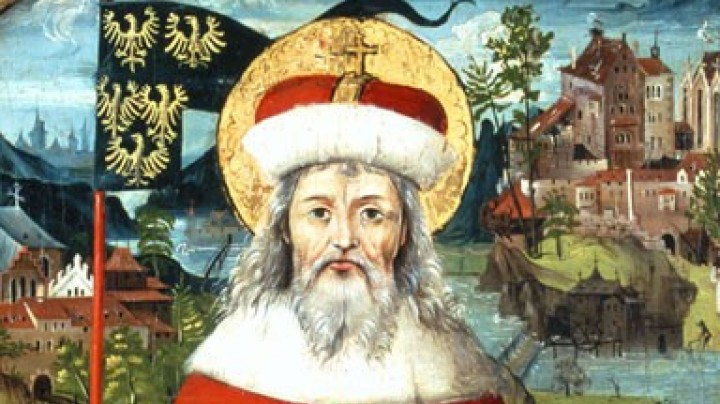Rudolf I: his ascent to become the head of the Holy Roman Empire
With his election as Roman-German king and seizure of the Austrian lands Rudolf secured his descendants a place in the first division of the princes of the Empire.
After the extinction of the Hohenstaufens and in the face of the turmoil of the interregnum it was in the interests of the princes to create order and a clear state of affairs. Their choice fell on Rudolf of Habsburg. Rudolf was elected head of the Empire in Frankfurt on 1 October 1273. His coronation took place in Aix-la-Chapelle on 24 October.
His election came as a surprise to him, as he was not among the most powerful princes of the Empire. King Ottokar II Přemysl of Bohemia (c. 1232–1278) was by far the most important of the electors and regarded himself as the natural head of the Empire. His seemingly unstoppable rise was felt to be progressing at too rapid a pace by the other electors: in addition to his ancestral lands of Bohemia and Moravia, Ottokar had also brought the inherited domains of the Babenberg dynasty, which had died out in 1246, that is, the duchies of Austria and Styria, under his control. He also commanded Carinthia and Carniola. Thanks to his participation in campaigns against the Old Prussians, a pagan ethnic group the Baltic, he also had influence on the nascent territory of the Teutonic Order on the Baltic Sea. The all too self-aggrandizing monarchical bearing of the Bohemian king was to be curbed.
It is Ottokar II who was also responsible for the widespread characterization of Rudolf as the ‘poor count’. This is a clear exaggeration, as Rudolf was extremely wealthy, even if he was a mere count and not a prince of the Empire. This image, mockingly conceived by Ottokar, of a count of allegedly modest means, was later taken over by Habsburg historiography in order to make the rise of the dynasty appear in an even more radiant light.
Rudolf saw his most important task as the creation of a dynastic power base commensurate with his newly acquired status. He could only extend his possessions in his native Swabia to a very limited degree, as he had to avoid alienating the local elites who constituted his political backing in the Empire. He was thus forced to look elsewhere for his attempts at expansion. For this the former Babenberg duchies of Austria and Styria, of which Ottokar had taken possession, presented themselves. However, this would inevitably lead to conflict with the Bohemian king. Nonetheless, the princes of the Empire expected Rudolf to take the necessary measures as proof of his authority against the powerful Ottokar. Initially Ottokar underestimated the Habsburg count.
At first Rudolf tried to proceed against the Bohemian king by taking steps according to imperial law, demanding the return of the lands that had been annexed during the interregnum. This was unacceptable to Ottokar; he ignored the summons to be re-enfeoffed with these possessions, something that would have been tantamount to subjecting himself to Rudolf’s authority. Rudolf duly had his rival outlawed and released his vassals from their oath of fealty, so that any of them that turned or even revolted against the ‘iron king’, as Ottokar was known on account of his autocratic style of rule, would not count as violating their oath of allegiance. Rudolf exploited the dissatisfaction with the Bohemian king’s forceful exercise of power among the local nobility and clergy. It was hoped that this would provide a pretext for Ottokar’s numerous adversaries within his lands to change sides.
By tenacious manoeuvring Rudolf also succeeded in forging an alliance with Ottokar’s adversaries. The Bavarian Wittelsbachs, Count Meinhard of Gorizia-Tyrol and the king of Hungary Ladislaus IV were among Rudolf’s allies.
In 1276 Rudolf started his first military campaign against Ottokar, taking an army into Austria while in a parallel move his allies occupied Styria. Weakened by an uprising among the Bohemian nobility, Ottokar was forced to concede and for the time being relinquished the Babenberg lands. Rudolf prepared to take power in Austria, entering Vienna, which had formerly been seen as loyal to the king of Bohemia, and confirming its privileges as a city immediate to the Empire that it had been granted decades before by Emperor Frederick II. The Hohenstaufen emperor had given the city these privileges in order to bring the Viennese populace onto his side in his conflict with the last Babenberg, Frederick the Quarrelsome. Likewise, Rudolf hoped to weaken the Viennese alliance with Ottokar by elevating the status of the city.













